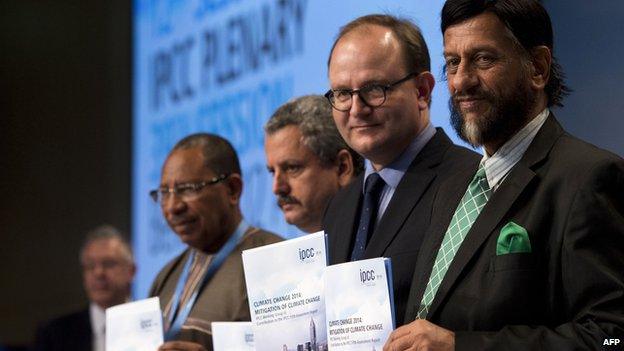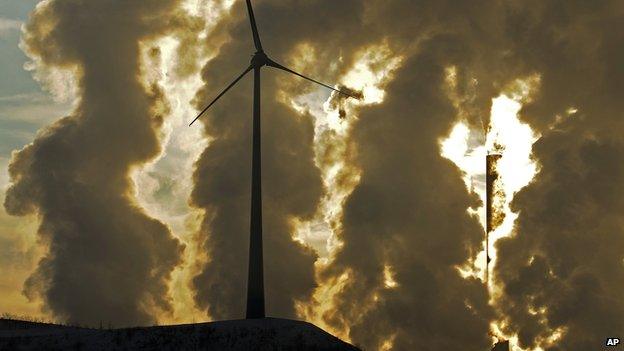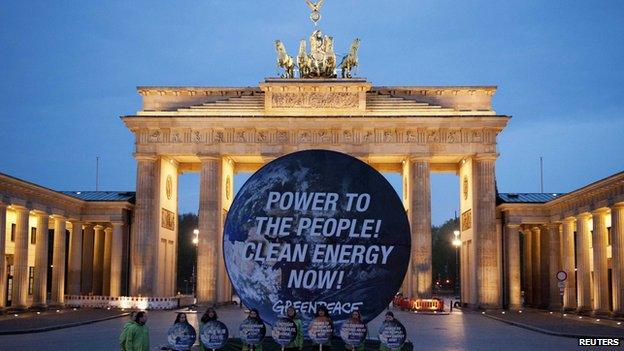The IPCC, Elvis and the elephant in the room
- Published
- comments

The IPCC presented the last of three highly anticipated reports in Berlin on Sunday
Everywhere you go in Berlin there are nostalgic echoes of the past - in the shadow of the wall's remnants, old Trabants take tourists on nostalgic car rides to times long gone.
And at the conference centre where IPCC delegates have been ensconced for a week deliberating on how to save the world from dangerous climate change, other ghostly voices have been making their presence felt.
Every night at the Estrel, Elvis lives. And so does Marilyn Monroe.
For the location is best known as the home of musical impersonators, the walls festooned with posters showing the capes, medallions and curled lips of the men who would be King.
In this slightly surreal atmosphere, the more sober suited ladies and gentlemen of the IPCC finalised a plan to end the world's addiction to carbon.
But their report clearly echoed the sentiments of the Memphis legend.
"A little less conversation, a little more action please..."
The world can tackle climate change said the leaders of this working group on mitigation: it is not rocket science, it is mostly economics.
Their Summary for Policymakers pointed out that investments in renewables needed to triple, subsidies to fossil fuels needed to decline and a switch to natural gas could help wean countries off coal.
Window of opportunity
But timing - in music, comedy and climate science - is everything.
The report's authors say there is a double-glazed window of opportunity that is rapidly closing.
If the world embraces low-emissions energy sources on a huge scale before 2030, the carbon curve can be bent in our favour.
If we don't act in time, we'll be trying to concoct some scheme to suck the CO2 out of the air and bury it in the ground.
The big changes being proposed by the IPCC can be done for what seems a bargain price of a 0.06% reduction in consumption growth every year until the end of the century.
"Statistically you won't notice," said Dr Ryer Gerlagh, who was a co-ordinating lead author on the economics chapter of this report.
"Developing countries may grow not by 5% per year, but 4.9%; in the UK you may not grow by 2% a year but 1.9% instead. There won't be any statistician who would be able to make the difference between the two."
'Huge pain'
So has the IPCC discovered a painless path to a carbon-free nirvana down in the jungle room?
Not quite.

The use of renewable energy such as wind and solar power would have to triple said the IPCC report
"There will be huge pain. We will have to change our energy supply systems. That may not cost us a lot of income, but we will have to think about windmills, solar panels - major changes. It is going to be tough," said Dr Gerlagh.
Fossil fuels will only have a future with technologies that capture their carbon. Many greens are unhappy with these concepts, believing that they're the devil in disguise.
Whatever the merits of the technologies, we just can't take the risk and we have to find a way to insure ourselves against the worst, says Dr Gerlagh.
"We should pay a risk premium, not because we are definitely certain the world is going to end, but we don't like the risk of playing with the Earth. We've got only one."
Who will pay?
While everyone is looking to the challenges ahead, some other participants here have been looking wistfully at the past, and not just because of Marilyn or Elvis.

Greenpeace activists held a demonstration at Berlin's Brandenburg Gate after the report was released
Some of the delegates were concerned that the past emissions that got the world into this climate mess seem to have been forgotten about.
"Countries are developing in different ways. There are some changes in their emissions patterns, but there are also historical emissions we have to take onboard," said Dr Yacob Mulugetta from the University of Surrey, another of the report's authors.
"The key question is how do you bring in the past emissions and align them with the future?"
This question seems to have sparked some of the same divisions between the developed and developing world that have hampered the UN climate negotiation process.
The scientists appear to have agreed on the causes, impacts and solutions to the climate challenge, but there are divisions appearing about who should cut, and who should pay. As we get clarity on the medicine, people begin to worry about the bill.
"They see the elephant from different angles," said Dr Mulugetta, "and it poses its challenges."